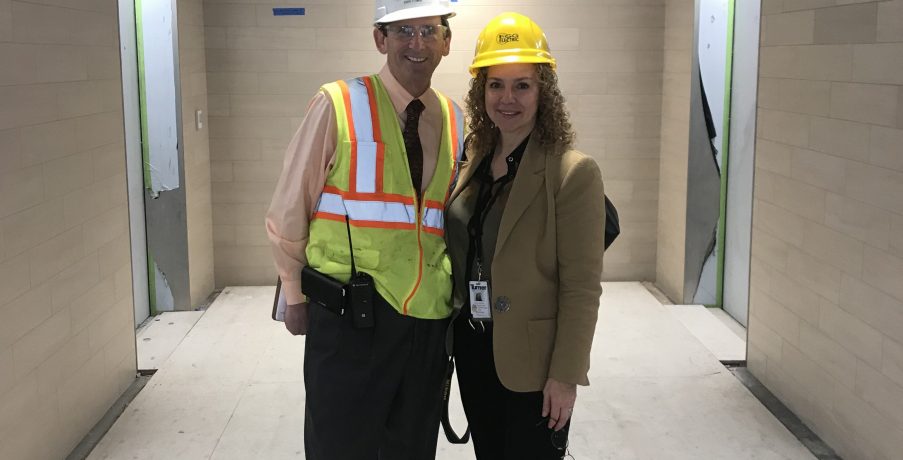
Neil A. Carousso produces NewsNation original “Kurt’s Country” – a celebration of country music and a slice of Americana with host Kurt Bardella.
-
Local Manufacturing Still Strong for Westchester’s Ball Chain 85 Years Later
Posted by: Neil A. CaroussoPost Views: 714By Joe Connolly and Neil A. Carousso
MOUNT VERNON, N.Y. (WCBS 880) — When the COVID-19 pandemic hit three years ago, local manufacturing became a critical need in the national emergency. But, there are few companies manufacturing all of their products in the United States.
Ball Chain Manufacturing Co., Inc. is the only U.S. supplier of ball chains remaining and the largest in the world. That type of chain is used for ceiling fans, hand bags and dog tags. Ball Chain is the exclusive supplier of dog tags to the U.S. military.
The secret to Ball Chain’s longevity: innovation and automation.
“Prior, when people could easily purchase chains overseas, we automated as much as we possibly can,” said president Bill Taubner on the WCBS Small Business Spotlight, sponsored by Dime Community Bank.
The Mount Vernon-based manufacturer can make more than 100,000 pieces and connect the chain without human labor.
“By adding that automation, that’s enabled us to really stay competitive throughout the industry,” said Taubner.
The company was founded by his great-grandfather Frank and his father Val out of their garage in the Bronx in 1938. Bill Taubner is the fourth-generation leader. Today, Bill works alongside his two brothers on daily operations while his father remains chairman.
Ball Chain Manufacturing has added services through the years, including painting the chains after they acquired a client and hired their employees. They have a product line called Shimmer Screen that are used as curtains and partitions at corporate headquarters such as LinkedIn, Crate & Barrel and Logan Airport in Boston.
It was also one of the manufacturers that stepped up during the pandemic. They created a whole new business by distributing masks for hospital workers.
“We quickly found out that the mask industry was full of nefarious people – a lot of people who were bringing counterfeit masks to markets,” Taubner said. “We never purchased from any middlemen, agents, third parties, intermediaries. And we put people could count on us for authentic masks that met standards.”
Ball Chain’s Bona Fide Masks now has more than a million customers worldwide.
See how Ball Chain Manufacturing continues to grow and spot the right business opportunities on the Small Business Spotlight video above.
-
Despite Uncertainty and Tech Layoffs, City Small Businesses are Growing Again
Posted by: Neil A. CaroussoPost Views: 530By Joe Connolly and Neil A. Carousso
NEW YORK (WCBS 880) — It appears small and midsize business owners are optimistic about their growth prospects for the rest of this year despite recession fears on Wall Street.
“They see more opportunities for growth, for bringing in revenue,” said Cory Schouten, editor-in-chief of Crain’s New York Business on the WCBS Small Business Spotlight, sponsored by Dime Community Bank.
“The catch there is that small and midsized businesses are seeing their costs increase, substantially, including their labor costs,” he added.
Crain’s recently surveyed the leaders of small and midsize businesses and found two-thirds of them expect their revenue to increase this year, but the same amount are seeing their costs rising. Half of those businesses expect to maintain staffing levels and, in fact, some report that they are hiring.
“A lot of companies are seeing this as an opportunity to go hire some tech talent that has been really impossible to hire, has been outside of their budget, but with some of the cutbacks in tech, other companies are snapping those people up,” said Schouten.
Some of those companies are raising capital and have even turned profitable.
Manhattan is an outlier in the city’s pandemic recovery, which has been more robust in the outer boroughs due to remote and hybrid work. Jobs have still not reached pre-pandemic levels.
“Office owners are updating their properties, so they’re very modern, they’re very adaptable for a flexible hybrid work environment. And, also, those owners of older office buildings in the city are looking at residential conversions,” Schouten said.
The Partnership for New York City reports office occupancy might remain at 56 percent for the foreseeable future, which is leaving the city with excess office space and few housing options until office buildings are converted. That continues to make Manhattan unaffordable for many employees.
“Right now there’s an office glut, but there’s not enough housing in the city. So, those two things can work together and kind of give us all a path forward,” said the Crain’s editor-in-chief.
Watch the WCBS Small Business Spotlight video above to see how local businesses are finding ways to grow.
You can read Crain’s New York Business’ economic outlook for 2023, available for free to WCBS 880 listeners, here.
-
Trailblazing Woman Breaks Down Barriers in Construction and Renewable Energy
Posted by: Neil A. CaroussoPost Views: 863By Joe Connolly and Neil A. Carousso
NEW YORK (WCBS 880) — There are few women in construction, electricity and renewable energy. But, Ellen Aschendorf has broken down barriers in each of these industries.
Aschendorf started a construction-related business more than 30 years ago. Today, she’s on the leading edge again with her company Egg Electric, Inc., which specializes in commercial electricity and renewable energy projects.
“People didn’t just accept me,” Aschendorf said on the WCBS Small Business Spotlight, sponsored by Dime Community Bank.
Her mentality: “I was going to finish the job, do everything correctly, and give excellence.”
Aschendorf said her superior work spoke for itself and became the only sales apparatus she needed when men in her industry would hang up the phone after finding out a woman led her company. Egg Electric relies on referrals and repeat clients, including Facebook, NYU Langone Health and Hudson Yards.
“We did two buildings for the business school for Columbia University,” she said, continuing, “We’re working for mostly the big corporate world as in right now we have projects going on for Facebook at 50 Hudson Yards, for Amazon at 424 Fifth Avenue, we’re doing a DDC (Department of Design and Construction) garage project in Queens, which has the EV, we’re doing the hospital for a long client NYU Medical.”
Many of Aschendorf’s clients have been with Egg Electric for decades. In fact, one of their early clients was the New York Mets. Electricians from Egg Electric were present at every home game at Shea Stadium to operate the scoreboard in right field. Company electricians still work with the Mets at Citi Field.
The company started building cell phone towers in the 1980s.
“So we started doing, right from the beginning, different work. And traditionally people were either, you did hospitals, schools, commercial, residential. You did one of those, but I didn’t know any better. So I started going wherever the jobs were.”
That ability to be nimble allows Egg Electric to follow sales in a changing industry. Today, they’re one of the companies building New York City’s electric vehicle infrastructure.
“(DDC) had us put a tremendous amount of infrastructure for phase two, like putting in empty pipes for future EV charters. That tells me that the city is already thinking about the future and they were expecting this to increase more and more,” said Aschendorf.
Watch the WCBS Small Business Spotlight video above.
-
Top Business Leader Calls New York’s Post-Pandemic Economy an ‘Industrial Revolution’
Posted by: Neil A. CaroussoPost Views: 630By Joe Connolly and Neil A. Carousso
NEW YORK (WCBS 880) — New York City office occupancy recently surpassed 50 percent for the first time since COVID-19 hit in 2020. That’s positive news for corporate executives, but it does not tell the full story of what’s happening in the city’s economy.
Kathryn Wylde leads the influential Partnership for New York City business group that represents corporations, including Goldman Sachs, Amazon and JP Morgan Chase & Co., and conducted that office survey. She told the WCBS Small Business Spotlight, sponsored by Dime Community Bank, that 82 percent of office workers are now enjoying a hybrid schedule.
“Prior to the pandemic, we’re talking about maybe 6 percent of the employers allowing people to work remotely,” said Wylde.
That’s the new normal or what the Partnership for New York City president and CEO labels a new “industrial revolution.”
“In the 70s, we had a dramatic experience of going from the old industrial economy to the service economy. Well, this is from the service economy to the digital economy. And instead of happening gradually over one or two decades, it happened instantaneously.”
Wylde noted entire industries have changed to be centered around technology.
“We have remote education, telemedicine, remote health, we’ve got remote work, remote entertainment, remote cultural experiences,” she said. “All of that has changed and I don’t think we know the implications yet.”
Wylde, like many traditional business leaders, believes strongly in in-person work, but she acknowledges Zoom has its place.
“We can fit more into our day when we can do Zoom instead of running to Midtown,” she said. “We just have to learn how to use that tool in a way that doesn’t interfere with building relationships and with the kind of mentoring and support and development that particularly young people need in their careers.”
Remote work has held back Manhattan’s recovery. The Partnership for New York City sees small and mid-size businesses in the outer boroughs and the suburbs growing at a record clip, but shrinking in Manhattan as rents remain near record highs.
“We have 32,000 new businesses formed in New York City in the last year. Manhattan’s the only one that didn’t have net growth in new businesses. Most of them are in Queens. Brooklyn is the number one. So, we’re seeing the city as a whole – its neighborhoods, its local business districts across the five boroughs and our surrounding suburbs – the economy’s pretty good,” said Wylde.
The main reason business groups see growth in the outer boroughs and the suburbs is that remote work has enabled people to shop in their communities during the week. Wylde said she is confident in Manhattan’s resurgence but it may take some time.
“The value of Midtown properties is going to spring back and it’s not going to be exactly the same as it was pre-pandemic. We’re going to see more residential, I think we know that, and that’s a good thing. It’ll make the streets safer on a 24/7 basis. It’ll bring back customers to local business.”
Watch the full conversation with Kathryn Wylde on the WCBS Small Business Spotlight video above.
-
Local Business Leader: NYC Should be the ‘Best Place in America to Work from Home’
Posted by: Neil A. CaroussoPost Views: 629By Joe Connolly and Neil A. Carousso
NEW YORK (WCBS 880) — Manhattan’s economy has changed drastically in the three years since the COVID-19 pandemic uprooted New York. Still, not much has been done to address the new needs of residents and workers.
Office occupancy remains below 50% and only a small percentage of those who have returned are working in-person five days a week. As a result, businesses that once thrived in office districts are struggling if they even survived the pandemic.
“I think we should make New York the best place in America, if not the world, to work from home,” said Jonathan Bowles, executive director of the Center for an Urban Future, on the WCBS Small Business Spotlight, sponsored by Dime Community Bank.
“That’s gotta be part of the strategy and certainly converting some of those office buildings, the ones that allow it for residential, it should happen. We’ve got to accelerate and expedite it,” he added.
Conversions to residential use have stalled due to government red tape. Bowles believes creating more of a residential borough will create more demand for the kinds of goods and services that small businesses are selling in those districts.
“Manhattan, certainly, is one borough where we’ve really seen the aging of the population, and so that’s led to kind of more doctor’s offices, healthcare offices, other things that I think are catering to an older population and we may see more of that going forward,” the business leader said.
The Center for an Urban Future is also reporting on many opportunities for small businesses to service non-profits who work in disadvantaged communities and launch technology companies in markets that have not been addressed such as “women and family tech” in which women are the main consumers.
“New York has a chance to be a real leader nationally or globally in that sub-sector of technology,” Bowles said. “E-learning is another area where New York has seen a real growth in local startups. There’s just so many different facets of tech that are still strong here and I think that that is going to continue to drive a lot of spending on small businesses and also kind of drive employment growth in the city.”
See ideas for new businesses and new markets on the WCBS Small Business Spotlight video above.











